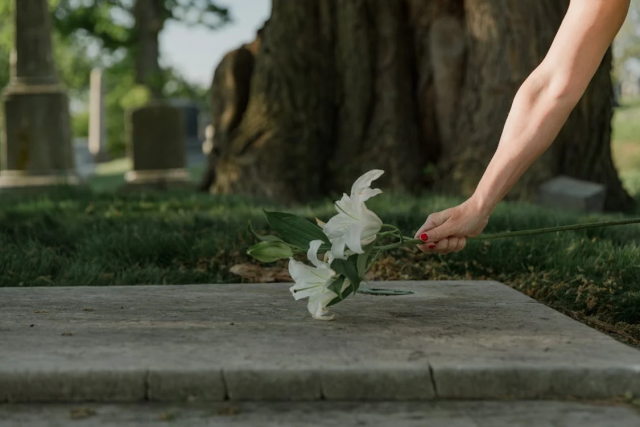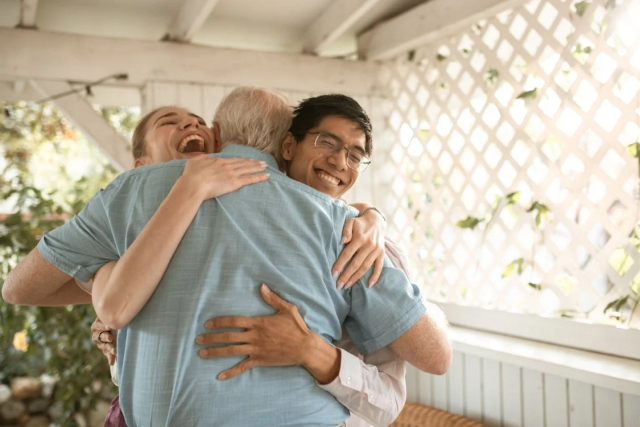Grief is something that many of us will experience at some point in our lives. It is something unavoidable that forces us to accept it whether we are willing to or not, and it can come in different shapes and forms. Losing a loved one, regardless of their relationship to us, can completely change our lives and is one of, if not the most, difficult thing we can endure.
While I cannot offer professional advice, I know what it feels like to experience loss whilst living away from my family. During my time working as a teacher in the Middle East, I lost my grandad who had been a very big part of my life and, several years prior to this, lost my dad very suddenly whilst being on the other side of the world from him. Coping with loss is tough, but doing so while being so far away from your loved ones can bring its own challenges.
During my time teaching overseas, I witnessed several friends and colleagues experience bereavement without their families. It is a situation which can become quite isolating and lonely, and it is why I wanted to share some tips (accompanied by anecdotes) that I have given to others over the years.

😮💨 Let go of any sense of guilt or regret
Letting go of regret is something that is much easier said than done and it is something I still struggle with from time to time. A few weeks ago, I lost an aunt and a family friend and I found that these thoughts of “I should have” once again came back. These are dangerous thoughts because they add no value to your life and ultimately do not change anything other than your mood.
It is natural that when we lose someone we begin to think things like: “I should have visited them during [x] holiday”, “I should have called/messaged more often”, “I should have told them how much I appreciated them”.
As an educator living abroad sometimes this feeling is heightened. Many of us choose to teach internationally so that we can travel and explore different parts of the world, but in doing so, it means we spend less time with friends and family back home. This can bring a feeling of guilt, because while we are out living our best lives, we miss the final moments of someone else’s.
After my grandad passed, I contemplated going back home, but I had so many commitments in regards to work and in my personal life that it became difficult to. I felt guilty that I wouldn’t be there to celebrate the life of someone who had had such an impact on mine. However, my family reminded me of something rather obvious, but often forgotten; if you shared such a special bond with someone, then the last thing they would want is to see you upset.
My dad and grandad were some of my biggest cheerleaders. They were supportive and felt proud of my accomplishments and the decisions that I made in life. It is this feeling that I carry with me and that I favour over any guilt or regret. It is what adds to and enriches my life rather than taking away from it.
While there are things that I wish I had done differently or things I wish I had said, I have had to learn to forgive myself. I believe that any time you look back fondly on memories of a loved one, that in itself is a celebration of their life and the bond you shared, without anything needing to be changed.
🌞 Don’t be too hard on yourself
There is no one-size-fits-all when it comes to grief. We all grieve in different ways. Some might be healthier than others, but essentially it is something that we cannot prepare for and may not have full control over. Some people may keep it hidden well while others visibly cannot function.
A few years ago, someone I knew lost their mum after a long battle with cancer. They were finding it incredibly difficult and had asked a friend of mine “how did Fiona cope with it so easily?”. The truth is that I was actually struggling, probably in more ways than I was able to realise at the time, but on the outside I did quite well keeping it together and carrying on with my life.
One of the worst things you can do for yourself in life, whether in this situation or any other, is compare yourself to someone else. We each have our own personal achievements and struggles which we don’t share with the world. Dealing with loss will test your emotional strength in ways you’d never experienced. If you find that you cry a lot or become more sensitive, it is not a sign of weakness, it is simply what you need to do to be able to come to terms with it.
⏳ Take all the time you need to grieve
I once heard someone tell a friend “it’s been [x] amount of time, you should be over it by now”. While everyone is entitled to their own opinions, I believe this is wrong. There is no expiry date for grieving. I have sometimes found that when I miss my dad I feel the need to justify it as several years have already passed.
Grief, even years later, remains dormant, but is still very much there. It often comes in waves and will reappear when we least expect it. However, time does help ease the pain. When a friend first told me “it will get easier” I didn’t see how, but over time you find that you slowly start to smile and laugh at memories rather than become upset by them. I have found that time can also bring a sense of closure, even if you didn’t get the chance to say goodbye, and that it pushes you to realise that you are much more resilient than you might think.

🧘 Give yourself time to breathe
As you may know, working in a school can be hectic and slightly chaotic at times. The days are jam-packed and there are always many tasks to get done. As soon as your students enter the classroom, any hints of sadness need to remain hidden and you take on the roles of both educator and entertainer. It can be an ideal distraction for someone coping with loss, but it also means you may not have time to breathe.
There are people who cope best when kept busy, otherwise they don’t really know what to do with themselves. However, pushing these feelings aside will increase your chances of burning out. I found out about my grandad’s passing as it neared the end of the academic year. I had deadlines and school events coming up, student reports to write and I was spending all my evenings at dance rehearsals, therefore getting very little sleep. Inevitably, it became too much and I reached my limit.
At the time, I felt that I couldn’t take time off work as I didn’t want to disappoint my colleagues or students. I also didn’t want to sit at home alone because it would probably make me feel more upset. However, in making this decision I forgot to give myself any downtime and made the mistake of not informing those around me. Living overseas, particularly if you are alone, can be isolating, but it can also increase your willingness to open up to others you usually might not speak to. Telling my colleagues, many of whom were friends, might have made me feel lighter and would have meant that they could have supported me with the workload if needed.
It is important to remember that just because you are alone does not mean that you need to be lonely. There will always be people around who can relate to you to some extent and will be willing to listen should you need it.
🧑🤝🧑 Find ways to stay close
Whether religious or not, many of us like to believe that those who have passed still remain with us in some way. For a lot of people, this helps them find comfort and helps them feel close to their loved ones. Being far away from family also means being far from your home and items that hold sentimental value; we may not even have access to things such as old photographs. Often times, objects can help us feel closer to someone who has passed and can help us fill a void, especially if they are their belongings or things they were fond of.
Nevertheless, physical objects aren’t the only things that have the power to do this. You can connect with someone through things like music, film, activities and books which they liked, which can be equally fulfilling. This can help us feel that we are continuously getting to know them and can strengthen our bond, even though they are no longer around.
💙 Making memories more meaningful
Losing a loved one can push even the happiest of people to become quite pessimistic. It is often difficult for us to find any silver linings in these situations, but there can be some if we change our way of thinking.
❤ The end of a life can make memories with someone a lot more meaningful than you could have ever anticipated. Even a word or facial expression that didn’t seem significant at the time becomes so much more special.
❤ Experiencing a loved one’s life’s end, particularly when unexpected, can sometimes cause you to live life in fear that it may happen again. But it is important that in these moments, we learn to feel more appreciative of those who still remain in our lives, even if we don’t get to see them often. Be grateful for the times you share and let them know how loved they are so that you’ll have no more “I should have”s.

If you are currently dealing with loss, I hope that you are able to find the strength to keep going. Teaching internationally has so many benefits and it can truly change our lives for the better, but when situations like this arise, it can become tough to be so far from home. I hope that my words bring you some form of comfort, no matter how small, and make you realise that, wherever you are in the world, you are not alone.
Remember, your memories of your loved one will keep them alive. ⭐




